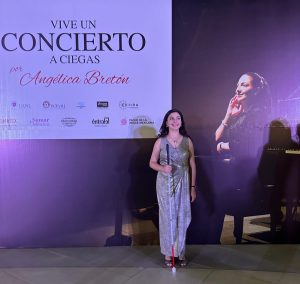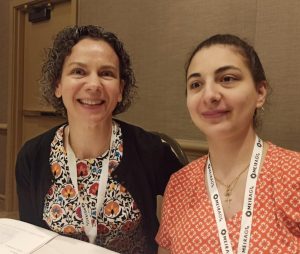A New Chapter: Reflections on Seven Years of Hope and Inspiration
Angelica Bretón Morán, a 29-year-old musician and educator from Mexico, was born with Leber congenital amaurosis (LCA) due to RPGRIP1 gene mutations (LCA6). In 2018, she shared her inspiring story with Hope in Focus (HIF), and since then, she has attended several LCA family conferences. We checked in with her seven years later to see how her journey has evolved. Through a Q&A, Angélica reflects on her experiences and insights.
What changes have you experienced over the past seven years?
I graduated from college in 2020 with a degree in music as a pianist, just as COVID-19 started. The plan was to take two exams—one as a soloist and another with the chamber orchestra but the pandemic delayed graduation. Graduating students were instructed to upload their performances to YouTube, and our professors evaluated them. The results were announced during an online graduation ceremony.
In October 2020, I began an online master’s degree in education at Universidad Tecmilenio. At the same time, I was working on my project titled “Area of Musical Research for the Blind and Visually Impaired,” which I had been volunteering on since I was age 10. It resulted in my job as the creator, founder, and leader of that department, later renamed the Music Research Center for Visual Disabilities (CIMUDIV). I completed my master’s degree in 2022, became certified as a professional instructor to conduct workshops, took a leadership course, and completed a diploma in music psychology.
At ISU University, I began a doctorate in the Development and Innovation of Educational Institutions in November 2024 to create academic content about the inclusion of people with visual disabilities in professional music. This area has very little content developed by someone who has lived this reality firsthand.
Can you share more about your job?
I work at the Faculty of Music of the Universidad Autónoma de Nuevo León (UANL). As the coordinator, founder, and creator of the Music Research Center for Visual Disabilities (CIMUDIV), we make the curriculum accessible to students with visual disabilities, including creating braille sheet music and providing personalized student support. It is not a special program for blind students. Instead, students use the same materials and perform like their sighted peers in their classes. I teach musicography to students with visual disabilities so they can read sheet music, and I support their teachers when needed.
We are constantly searching for tools and strategies that make our work and the students’ learning easier, which involves researching, experimenting, and adapting. It’s not unusual to find people with visual disabilities who are active music community members, but much still needs to be done! Changing our mindset and that of society requires patience.
What has been encouraging?

Angélica Bretón Morán at the 2024 Blind Concert in Mexico
Something that thrilled me was the Blind Concert performance held in November 2023. Because it was canceled during the pandemic, I thought we might never experience it again. The concert, held for 11 years in various locations, raises awareness through music by taking the audience on an emotional journey. For me, music is a powerful language that reaches the deepest fibers of the soul. Seeing the entire cast reunited was an unforgettable and emotional experience. In May 2024, the concert was performed outdoors for the first time before 300 people, achieving another milestone.
What are your observations related to LCA?
Learning never stops, and it is fantastic to see how the topic of LCA has progressed. We’re talking about clinical trials, experimental treatments, research, and new diagnoses, things that seemed unthinkable 20 years ago. When I was younger, we weren’t sure if I had LCA. Now, hearing that someone has a genetic diagnosis is incredible.
It’s become easier to access the LCA community, which is more informed and has more people willing to share their experiences. The support network is stronger, and patients of all ages are involved. Social media and Facebook groups allow us to stay in touch with other families and organizations like Hope in Focus.
One exciting breakthrough is that Odylia Therapeutics is developing a gene therapy for my mutation, the RPGRIP1 gene, and testing it on mice. As a 29-year-old blind person, the idea that my vision might improve in the future is exciting and terrifying!
What are your thoughts about the LCA Family conferences you’ve attended?
My experiences at the conferences have been wonderful! I met many people whom I now care deeply for. At the 2023 conference, we met Toprak and her family from Turkey. Toprak’s parents saw my story on the HIF website, and it was touching to hear that my story gave them hope. It’s important for adults with LCA to attend the conference and share their experiences with other families.

Angélica Bretón Morán (right) with Dr. Emily Place (left) during the 2023 Hope in Focus Family Conference in Indianapolis
We hear from the researchers, foundations, and people who make LCA research possible during the conference. At the first LCA conference, I met Dr. Emily Place, who gave me my genetic result when I was 20. I couldn’t believe she was standing before me, and I hugged her with gratitude.
Meeting Toprak reminded me of another family at my first LCA conference. We met a 2-year-old girl named Dafne and her parents. Our parents started talking, and the girl and I had similar characteristics. My parents said that seeing Dafne was like seeing me when I was little, and the anxiety expressed by her parents was similar to theirs. I understood how important it was to be at the conference and how difficult it is for other families to process what I live with daily. I felt a moral commitment to be more involved in the LCA community as an adult.
At another conference, I met a mother with LCA traveling alone with her baby, who did not have LCA, leaving her other children at home. I was a teenager and had never met a mother with LCA. This woman became a role model for me.
I’ve learned the most about LCA at the conferences. There, we can ask our questions directly to professionals, listen to others’ concerns, and learn from their stories. I’ve also seen how the LCA community has grown in numbers and knowledge. Moreover, there’s yet to be published scientific information shared, which feels like privileged access.
Attending the LCA conference feels like reuniting with a big family. I am deeply grateful to HIF for all the support they’ve given. Every second I’ve spent at the conferences has been worth it.
How do you bring conference content back to your LCA community?
Whenever someone contacts me, I tell them about HIF and ask them to follow its social media. I also share my conference experiences and explain why attending and getting involved in the community is so important.
Our Spanish-speaking WhatsApp group has people from different parts of the world. We share what is discussed when I attend conferences or when a group member attends other LCA-related events. Many members speak only Spanish, so I support them when they need translations, but I also encourage them to write in Spanish in the Facebook groups. Many people from other countries post in their languages, but we can translate texts easily thanks to technology.
Also, artificial intelligence and technology are quickly advancing, so the language barrier is now less complicated. I encourage people not to let language be a limitation. My dad and I started attending these conferences when we spoke little English and didn’t understand much. That experience pushed us to improve our skills.
You are an ambassador for LCA in Mexico. How did that evolve, and what did it look like?
When I was young, no community or information about LCA existed in Mexico. My parents were very worried about my development and diagnosis. However, one day, they read a letter from a 22-year-old Italian girl with LCA who studied music, giving them great hope.
When I was 22, I wrote a post on my Facebook blog about my experience with LCA and mentioned not knowing other people with my genetic mutation. The response was unexpected! Many people and organizations shared my story, and that’s how I met people from Mexico and Spain.
Most of the people with LCA who reach out to me do so via social media or through the families in our WhatsApp group. Using WhatsApp, we share any relevant information we find. If a question arises, I consult with my geneticist in Mexico, and some members offer to check with their doctors. When I find people or communities on social media sharing information related to LCA, I invite them to join the group or follow related pages. Our goal is to provide information and mutual support.
I also created a Facebook group for people with my genetic mutation, similar to the RPE65 group and others. In the RPGRIP1 group, we communicate closely with Odylia Therapeutics.
In 2019, I started a civil association in Mexico, equivalent to a United States foundation. My idea was to help and receive support, but Mexico’s legal aspect is very complicated. After careful consideration, my family and I decided to dissolve the association and continue supporting the community in other ways.
What are your hopes for the future?
I hope to find better ways to continue supporting the community and that everyone with an LCA diagnosis finds a strong support group. From experience, unity is more powerful than material resources. It is crucial that we not only look out for ourselves but also for others. Although the future is uncertain, that’s nothing new to me. I do everything within my power and fully trust that my safety is in God’s hands. He knows what I don’t, and that’s enough to keep moving forward.
